Module 9 Great inventions外研社英语九上
Module 9 Great inventions重要知识点讲解外研版九年级英语上册

Module 9 Great inventions重要知识点讲解1. Can I borrow your camera?borrow表示“借入”lend表示“借出”borrow sth. from sb. 表示“向某人借某物”。
例如:I borrowed a book from the library yesterday.昨天我从图书馆借了一本书。
2. They’ll be put up on the school website.put up表示“张贴,公布”。
例如:You can put up the notice on the noticeboard.你可以把通知贴在布告栏上。
3. In the past, we mainly got information from paper books.in the past表示“在过去”。
mainly表示“大部分地,主要地”。
是副词。
它的形容词为main。
例如:We mainly get food from the land and sea.我们主要从陆地和海洋获取食物。
4. Some were huge ones with thousands of pages.thousands of 表示“成千上万的”。
例如:Thousands of birds fly back to the north in spring.成千上万的鸟儿在春天飞回北方。
5. And the memory card may be full.memory 表示“内存,存储器”。
full adj. 满的;充满的例如:My suitcase was full of books.我的提箱装满了书。
6. That can be fixed.此句为含有情态动词的被动语态。
结构为情态动词+be+过去分词。
fix v. 修补,挽救例如:The broken window need to be fixed. 这个破窗户需要修补。
外研版九年级英语上册说课稿《Module9GreatinventionsUnit1》

外研版九年级英语上册说课稿《Module 9 Great inventions Unit 1》一. 教材分析《Module 9 Great inventions Unit 1》的外研版九年级英语上册教材,以“Great inventions”为主题,引导学生学习科学家们的重要发明,以及这些发明对人类社会的影响。
本单元的主要内容是介绍三位科学家的重要发明:爱迪生的电灯、莱特兄弟的飞机和贝尔的电话。
通过学习这些发明,学生可以了解科学家们的研究过程、创新精神和对人类社会的贡献。
二. 学情分析九年级的学生已经具备了一定的英语基础,能够理解和运用一些基本的英语语法和词汇。
然而,由于本单元的内容涉及到一些专业术语和复杂的句子结构,学生可能会觉得比较困难。
因此,在教学过程中,需要注重帮助学生理解和运用这些专业术语和句子结构,同时激发他们的学习兴趣和探究精神。
三. 说教学目标1.知识目标:学生能够掌握本课的生词和短语,理解课文内容,了解爱迪生、莱特兄弟和贝尔的重要发明及其对人类社会的影响。
2.能力目标:学生能够运用所学知识进行口语表达和写作,提高他们的英语综合运用能力。
3.情感目标:通过学习科学家们的创新精神和对人类社会的贡献,激发学生的学习兴趣和探究精神,培养他们的社会责任感和使命感。
四. 说教学重难点1.教学重点:学生能够掌握本课的生词和短语,理解课文内容,能够运用所学知识进行口语表达和写作。
2.教学难点:学生能够理解一些专业术语和复杂的句子结构,能够运用这些专业术语和句子结构进行口语表达和写作。
五. 说教学方法与手段1.教学方法:采用任务型教学法,让学生在完成任务的过程中,学习和运用所学知识。
2.教学手段:利用多媒体课件和网络资源,为学生提供丰富的学习材料和资源,帮助他们更好地理解和运用所学知识。
六. 说教学过程1.导入:通过展示一些常见的发明,如手机、电脑等,引导学生谈论发明和创新,激发他们的学习兴趣和探究精神。
外研版九年级英语上册Module 9 Great inventions教案

Module 9 Great inventions【教材分析】Module 9的主要内容为运用一般将来时的被动语态来描述伟大的发明,包括造纸和印刷术的发明,电脑的出现和网络的广泛使用。
从全书来看,本模块承接上一模块对被动语态的学习和运用,着重一般将来时被动语态的使用,让同学们通过课堂活动来掌握其用法。
Unit 1 Will computers be used more than books in the future?【教学目标】●Knowledge objective1. Words: borrow,website,mail,textbook,mainly,page,electronic,powerful,memory,full,fix,instructions, lend, properly2. Expressions: put up, thousands of●Ability objective1.To listen and read the materials about computer.2.To make a dialogue about the wide use of the computer.●Moral objective1. To arose Ss’ interest in great inventions.2. To make Ss be proud of our great inventions in our country.3. To make Ss love our country and study hard.【教学方法】PWP method, task-based method and interactive approach【教学手段】A tape recorder, multimedia and some pictures【教学过程】Teaching Procedures:Step 1 Leading-inSs look the pictures and answer the questions.Step 2 PresentationLook and say. The teacher shows the pictures of new words and let the students to say as soon as possible.Step 3 Look and sayLook at the pictures and answer the questions in pairs.1. How have these inventions changed people’s lives?2. Which one do you think is the most important?3. What other important inventions can you think of?Step 4 Listening1. Listen and complete the sentences.1Linging loves her mobile phone because she can ______________.2All of Daming’s friends’ numbers are _______ in his phone.3Today’s cam eras are better than old cameras because they do not ________ and the photos can ______________.4Lingling thinks everything ___________ by computer to some degree, so the computer is __________________ invention.2. Listen to Part 3 and answer the following questions.1. What will Tony do on the school visit to the museum?2. Where did we get mainly information in the past?Step 5 Reading1.Find out the sentences which belong to the passive voice in the dialogue.1. They’ll be put up on the school website.2. And they can be seen on the Internet by other classes.3. Will computers be used more than books in the future?2.Now read the summary of the conversation. Underline the wrong information and correct it.Tony wants to borrow his father’s camera and take some photos of the school dance and the basketball match. The photos wil l be shown in the school magazine. Tony’s dad lends the camera. He promises Tony to look after it.3.Find the sentences in the conversation which mean:1 Changing the subject, can I get the camera?2. It is not a problem. I will use another memory card.3 I will do what you tell me to do.4.Answer the questions.electronic fix instruction invention lend mail page website1 How do you fix a camera if the memory is full?2 When do you need to read the instructions?3 How often do you send messages by mail?4 How many pages does this book have?5 Which website do you often go to when you get online?6 What is an example of electronic technology?7 When you lend something to someone, what do they have to do later?8 What do you think is the most important invention in human history? Step 6 Everyday EnglishLet Ss say the everyday English that they have learnt in the passage.•I wonder …•Perhaps.•Here it is.•Promise!Step 7 Language points1. Can I borrow your camera?borrow表示“借入”lend表示“借出”borrow sth. from sb. 表示“向某人借某物”。
外研版九年级英语上册教学设计《Module 9 Great inventions Unit 1》

外研版九年级英语上册教学设计《Module 9 Great inventions Unit 1》一. 教材分析《Module 9 Great inventions Unit 1》主要介绍了四大发明:造纸术、印刷术、指南针和火药。
本课旨在让学生了解中国古代的四大发明及其对世界文明发展的贡献。
教材通过讲述这些发明的历史背景、发明过程以及它们对人类社会的影响,激发学生对科学知识的兴趣,培养学生的创新意识。
二. 学情分析九年级的学生已经具备了一定的历史知识,对四大发明有一定的了解。
但在英语表达方面,学生可能对这些发明的英文名称和描述还不够熟悉。
因此,在教学过程中,教师需要帮助学生回顾相关历史知识,并加强英语表达的训练。
三. 教学目标1.知识目标:–学生能够掌握有关四大发明的英文名称和简单描述。
–学生能够用英语简要介绍四大发明及其对世界文明的影响。
2.能力目标:–学生能够运用所学知识,进行听力、口语、阅读和写作的训练。
–学生能够通过合作学习,提高与他人沟通和协作的能力。
3.情感目标:–学生能够激发对科学知识的兴趣,培养创新意识。
–学生能够认识到中华文明的伟大,增强民族自豪感。
四. 教学重难点•学生能够掌握有关四大发明的英文名称和简单描述。
•学生能够用英语简要介绍四大发明及其对世界文明的影响。
•学生能够运用所学知识,进行听力、口语、阅读和写作的训练。
•学生能够通过合作学习,提高与他人沟通和协作的能力。
五. 教学方法1.任务型教学法:通过完成各种任务,激发学生的学习兴趣,培养学生的实践能力。
2.合作学习:鼓励学生分组讨论,提高学生的沟通和协作能力。
3.情境教学法:创设情境,让学生在真实的环境中运用所学知识。
4.语法翻转教学法:通过引导学生发现和总结语法规则,提高学生的语言运用能力。
六. 教学准备1.教师准备PPT,展示四大发明的图片、历史背景和英文描述。
2.教师准备相关历史资料,以便在课堂上为学生提供更多相关信息。
九年级英语上册 Module 9 Great inventions课件 (新版)外研版
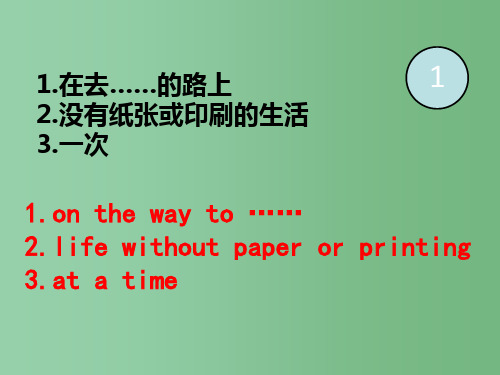
paper-making
printing gunpowder pass
Module 9 Great inventions
Fast reading
Match the main ideas
a.The world before printed books 1st Para.
1.cheer for 2.face the truth 3.have got no chanink it will be safe to buy things online育 B. What do you use the puter for? C. Sometimes I see films and make friends on the puter. D.Do you like shopping online? E. The puter is very important in modern life.
⑴ The Internet is still young, but it is growing very fast and may bee more powerful than
2.These photoWs_i_l_l b__e_ p_u_t__u_p__(张贴) on the school website tomorrow.
拼读单词 1.完了的,结束的 2.创立,创建 3.胜利
1. over 2. found 3. victory
10
翻译短语 1. 为……喝彩 2.面对现实 3.没机会
2
翻译短语
3
1.结果,这样一来
2.手工制作
外研版初中九年级上册英语 Module 9【早读手册】 Unit 1 早读手册
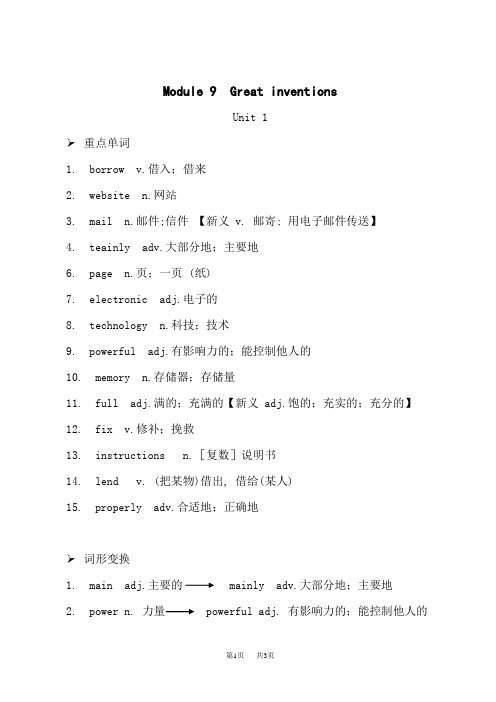
Module 9 Great inventionsUnit 1➢重点单词1. borrow v.借入;借来2. website n.网站3. mail n.邮件;信件【新义 v. 邮寄; 用电子邮件传送】4. teainly adv.大部分地;主要地6. page n.页;一页 (纸)7. electronic adj.电子的8. technology n.科技;技术9. powerful adj.有影响力的;能控制他人的10. memory n.存储器;存储量11. full adj.满的;充满的【新义 adj.饱的;充实的;充分的】12. fix v.修补;挽救13. instructions n.[复数]说明书14. lend v. (把某物)借出, 借给(某人)15. properly adv.合适地;正确地➢词形变换1. main adj.主要的 mainly adv.大部分地;主要地2. power n. 力量 powerful adj. 有影响力的;能控制他人的3. lend v. (把某物)借出,借给 (某人) 反义词 borrowv. 借入;借来4. proper adj. 合适的;适当的 properlyadv.合适地;正确地➢重点短语1. take photos 照相2. put up 张贴;公布3. on the Internet 在网上4. wait for 等待5. hear from 收到……的来信6. in the future 在将来7. in the past 在过去8. thousands of 好几千;成千上万9. electronic technology 电子技术10. memory card 存储卡11. take (good) care of (好好)照顾➢重点句型1. 它们将被公布在学校的网站上。
They’ll be put up on the school website.2. 那可以解决。
外研版九年级上册英语《Module9GreatinventionsUnit3》集体备课说课稿

外研版九年级上册英语《Module 9 Great inventions Unit 3》集体备课说课稿一. 教材分析《Module 9 Great inventions Unit 3》主要介绍了四大发明——造纸术、印刷术、指南针和火药。
本课通过讲述这些发明的历史背景、发明过程以及对世界的影响,使学生了解中国古代的科技成就,培养学生的民族自豪感。
同时,本课还涉及一些与发明相关的英语表达和语法知识。
二. 学情分析九年级的学生已经具备了一定的历史知识,对四大发明有一定的了解。
但在英语表达方面,学生可能存在一定的困难。
此外,学生可能对英语课文中的一些细节内容感兴趣,需要教师引导关注。
三. 说教学目标1.知识目标:学生能够掌握与四大发明相关的英语表达,正确运用一般过去时描述历史事件。
2.能力目标:学生能够通过阅读、听力等方式获取文本信息,提高阅读理解能力。
3.情感目标:学生能够了解中国古代的科技成就,培养民族自豪感。
四. 说教学重难点1.教学重点:学生能够掌握与四大发明相关的英语表达和语法知识。
2.教学难点:学生能够运用英语描述四大发明的历史背景和影响。
五. 说教学方法与手段1.教学方法:采用任务型教学法,引导学生通过阅读、讨论等方式主动获取知识。
2.教学手段:利用多媒体课件、图片等辅助教学,提高学生的兴趣和参与度。
六. 说教学过程1.导入:教师通过展示四大发明的图片,引导学生回顾已学过的历史知识,激发学生的兴趣。
2.阅读理解:学生阅读课文,回答相关问题,了解四大发明的历史背景和影响。
3.小组讨论:学生分组讨论,用自己的语言总结四大发明的英语表达。
4.课堂展示:各小组代表进行课堂展示,分享自己的总结成果。
5.语法讲解:教师针对课文中出现的语法知识进行讲解,引导学生正确运用一般过去时。
6.课后作业:学生完成课后练习,巩固所学知识。
七. 说板书设计板书设计如下:Module 9 Great inventions1.Papermaking2.Printingpass4.Gunpowder八. 说教学评价1.课堂参与度:观察学生在课堂上的积极参与情况,包括发言、讨论等。
九年级英语上册Module9Greatinventions知识点(新版)外研版

Module 9 知识点一.Put up 的用法:“公布;张贴;搭建”是由动词+副词构成的动词短语例:How beautiful the mountain is !I’d like to _____a tent there .You’d better not .A, put on B, put off C, put up二, hear from sb =get /receive a letter from sb 收到某人的来信三, It be +形容词+(for/of sb )+to doIt 是形式主语,动词不定式to do 是真正的主语.因为有时作主语的不定式短语太长,所以放在后面例:It’s good to help each other .=To help each other is good .It is important for us to learn English well .四:borrow 和lend 的区别Borrow sth from sb /someplace例:You may borrow the book from the library .Lend sth to sb =lend sb. Sth例:I have lent my bike to Jim .Borrow 和lend 都是非延续性动词,不能和表示一段时间的状语连用如果要表示借多长时间,要用延续性动词keep 或have .例:You may keep this book for one month .五:look through 的用法“透过。
看去;浏览,快速查看”例:Look through this window and you’ll see a beautiful garden .She spent the whole night looking through the students’ homework .例:4G Internet makes it possible for us to ____the information easily and quickly . A, look like B, look after C, look around D, look through六. As a result of 为介词短语,后接名词或名词性短语,表示原因相当于because of例:He was late as a result of the snow .因此,我们不得不给菜园浇水_____ ______ _______,we have to water the vegetable garden .七,可以修饰比较级的词:Much ,still, even ,a lot ,a little ,a bit ,用来加强比较级的程度和语气,使意思更加明确例:He is much stronger than his father .Why don’t you do it a little earlier ?例:If more people give up driving cars ,the air will get much ____in a few days .A, clean B, cleaner C, the cleanest八, at a time “每次,一次”例:I can only talk to one at a time .我一次只能跟一个人谈话。
外研版九年级上 M9 Great Inventions
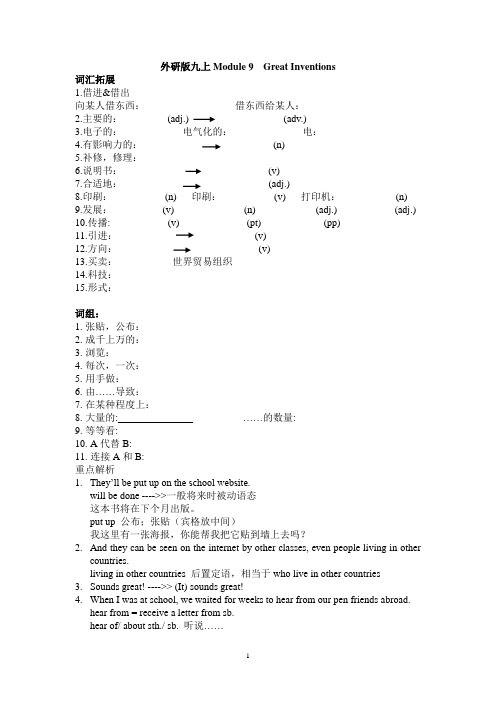
外研版九上Module 9 Great Inventions词汇拓展1.借进&借出____________ __________向某人借东西:借东西给某人:2.主要的:_________(adj.) ___________(adv.)3.电子的:___________ 电气化的:__________ 电:__________4.有影响力的:__________ _________ (n)5.补修,修理:__________ __________________6.说明书:___________ __________ (v)7.合适地:__________ ____________ (adj.)8.印刷:__________ (n) 印刷:__________ (v) 打印机:___________(n)9.发展:__________(v) ____________(n) ___________ (adj.) ___________(adj.)10.传播: ___________(v) __________ (pt) __________ (pp)11.引进:__________ __________ (v)12.方向:__________ __________ (v)13.买卖:__________ 世界贸易组织_________ ___________ ___________14.科技:___________15.形式:___________词组:1.张贴,公布:________________2.成千上万的:_________________3.浏览:________________4.每次,一次:_______________5.用手做:___________________6.由……导致:_________________7.在某种程度上:_________________8.大量的:_______________ ……的数量:_______________9.等等看:________________10.A代替B:_______________11.连接A和B:________________重点解析1.They’ll be put up on the school website.will be done ---->>一般将来时被动语态这本书将在下个月出版。
英语外研九年级上册Module 9 Great inventions

2 All of the boy’s friends’ numbers are _______ in his phone.
3 Today’s cameras are better than old cameras
because they do not need film and the photos can be sent _b_y_e_m__ai_l _______.
memory card.
OK. That can be fixed. I’ve got an
empty memory card.
3. I will do what you tell me to do.
Promise!
Task 5
P72 Tony wants to borrow his father’s cam3eRraeaadntdhetaskuemsmomarey opfhtohteos of the schooocinlnodftnohavrenmecsrasectahiaotoinnoodnal .nvtUhidsneictdobteorarrlsetikhnceeet timttbh.auelslwemruomantgch. The photos will be shown ionnththeesscchhooooll mwaegbasziitnee. Tony’s dad lends the camera.
4. The camera was bought by
as a gift.
A. Tony. B. Tony's father. C. Tony's mother.
Listen again and check the true sentences.
2019年外研版九年级上册英语教案:Module9 Greatinventions
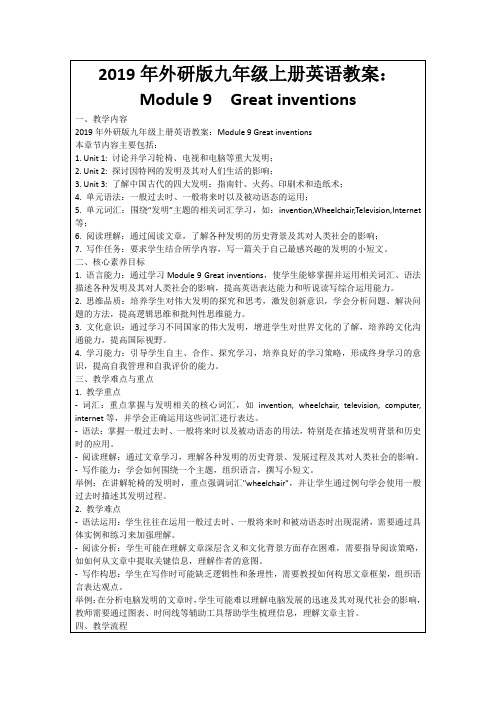
四、教学流程
(一)导入新课(用时5分钟)
同学们,今天我们将要学习的是Module 9 Great inventions。在开始之前,我想先问大家一个问题:“你们在生活中是否遇到过因某个发明而让生活变得更便捷的情况?”(例如:通过网络购物)这个问题与我们将要学习的内容密切相关。通过这个问题,我希望能够引起大家的兴趣和好奇心,让我们一同探索伟大发明的奥秘。
7.写作任务:要求学生结合所学内容,写一篇关于自己最感兴趣的发明的小短文。
二、核心素养目标
1.语言能力:通过学习Module 9 Great inventions,使学生能够掌握并运用相关词汇、语法描述各种发明及其对人类社会的影响,提高英语表达能力和听说读写综合运用能力。
2.思维品质:培养学生对伟大发明的探究和思考,激发创新意识,学会分析问题、解决问题的方法,提高逻辑思维和批判性思维能力。
-语法:掌握一般过去时、一般将来时以及被动语态的用法,特别是在描述发明背景和历史时的应用。
-阅读理解:通过文章学习,理解各种发明的历史背景、发展过程及其对人类社会的影响。
-写作能力:学会如何围绕一个主题,组织语言,撰写小短文。
举例:在讲解轮椅的发明时,重点强调词汇"wheelchair",并让学生通过例句学会使用一般过去时描述其发明过程。
3.文化意识:通过学习不同国家的伟大发明,增进学生对世界文化的了解,培养跨文化沟通能力,提高国际视野。
4.学习能力:引导学生自主、合作、探究学习,培养良好的学习策略,形成终身学习的意识,提高自我管理和自我评价的能力。
外研版九上Module 9 Great inventions
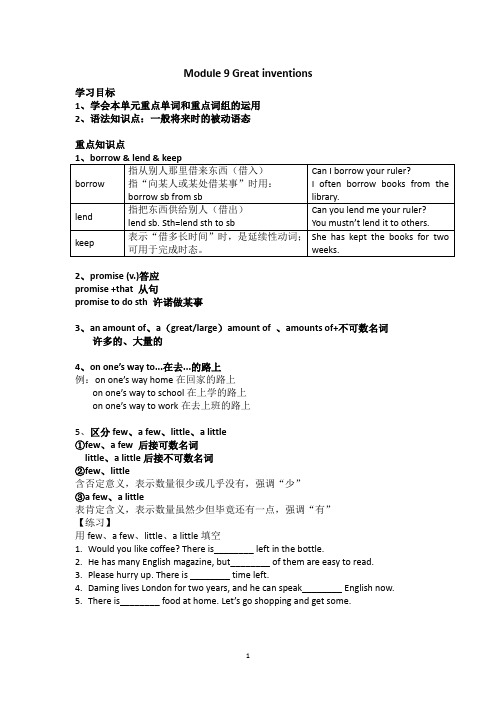
Module 9 Great inventions学习目标1、学会本单元重点单词和重点词组的运用2、语法知识点:一般将来时的被动语态重点知识点2、promise (v.)答应promise +that 从句promise to do sth 许诺做某事3、an amount of、a(great/large)amount of 、amounts of+不可数名词许多的、大量的4、on one’s way to...在去...的路上例:on one’s way home在回家的路上on one’s way to school在上学的路上on one’s way to work在去上班的路上5、区分few、a few、little、a little①few、a few 后接可数名词little、a little后接不可数名词②few、little含否定意义,表示数量很少或几乎没有,强调“少”③a few、a little表肯定含义,表示数量虽然少但毕竟还有一点,强调“有”【练习】用few、a few、little、a little填空1.Would you like coffee? There is________ left in the bottle.2.He has many English magazine, but________ of them are easy to read.3.Please hurry up. There is ________ time left.4.Daming lives London for two years, and he can speak________ English now.5.There is________ food at home. Let’s go shopping and get some.6、重点词组专项练习1.-----Mum, where did you put my new MP3?-----I put it in ________ yellow box under your desk.A. aB. anC. theD. 不填2. -----Whose book is this? Is this yours?---- No, it ’s ________.A. herB. sheC. myD. hers3. You have just read this newspaper. Did you find_______ in it?A. interesting anythingB. anything interestingC. interesting somethingD. something interesting4. ________ interesting book the girl has!A. HowB. How anC. what aD. what an5. Li Ping runs _______ than Ji Fang.A. more slowlierB. very much slowlyC. much more slowlyD. very slowly6. I ’m waiting for Jack ________, I will go swimming alone.A. If he doesn ’t comeB. If he won ’t comeC. If he will comeD. If he is coming7. There _______ a football match on TV this evening.A. will haveB. is going to beC. hasD. is going to have8. ----- Could you tell me _______?---- Sorry. I don ’t know. I was not at the meeting.A. what does he say at the meetingB. what did he say at the meetingC. what he says at the meetingD. what he said at the meeting9.They have never been to America, _______?A. have theyB. haven ’t theyC. don ’t theyD. do they10. ----- Would you like to go hiking with me, Susan?----- I ’d like to, _______ you don ’t want to go alone.A. untilB. beforeC. ifD. after1. to some degree 在某种程度上2. put up 搭建,张贴3. on the school website 在学校网站上4. take good care of 好好照顾5. by email 通过电子邮件6. be replaced by 被…...取代7. look through 浏览8. at a time 一次9. by hand 用手 10. as a result 作为结果;因此 11. in a way 在某种程度上 12. wait and see 等着瞧 13. keep away from 远离 14. be around 存在着 15. more and more... 越来越多...... 16. thousands of 成千上万...... 17. do research 做调查 18. search for 寻找11.-----Are your parents doctors, too?----- No, they are teachers. ________ of them love teaching very much.A. AllB. BothC. NoneD. Neither12. China is famous ________ the Great Wall.A. asB. forC. toD. of13. It’s careless _____ him to make the same mistake again. I think it important______ everyone to be careful in everything.A. to; forB. for; ofC. of; toD. of; for14. This old man lives _____, but he never feels _______.A. alone; aloneB. lonely; aloneC. lonely; lonelyD. alone; lonely15. Everyone was ________ when they heard this ________ news.A. excited; excitedB. exciting; excitingC. excited; excitingD. exciting; excited三、完形填空A lady once wrote a long story. She sent it to a famous editor. After36 weeks the editor 37 the story to her. The lady was 38 . She wrote back to the editor: “Dear Sir.Yesterday you sent back a story of mine. 39 do you know that the story is not good? You did not read it. 40 I sent you the story, I pasted(粘)together pages 18;19 and 20. This was a 41to see whether you would read the story. When the story came back yesterday, the pages were 42 pasted together. Is this the 43 you read all the stories that are sent to you?”The editor wrote back:“Dear Madam,When I have an egg 44 breakfast, I 45 eat the whole egg in order to discover that it is bad.”36. A. few B. a few C. little D. a little37. A. gave B. came back C. handed D. returned38. A. angry B. happy C. satisfied D. glad39. A. How B. Why C. What D. Where40. A. After B. until C. Before D. Since41. A .lesson B. test C. question D. thing42. A. already B. still C. even D. yet43. A. work B. check C. road D. way44. A. on B. for C. at D. in45. A. must not B. have not to C. need not to D. don’t have to四、阅读理解ADifferent people have different ideas about time. People in the USA think that it is important to know the time. In cities in America, there are clocks in stations, factories and other buildings. Radio announcers(播音员) give you the correct time during the day. Most Americans also have watches with them wherever they go.They want to do certain(一定) things at certain time. They don’t like to be late.But time is not so important to everybody in the world. When you visit a country in South America, you will find that people there don’t like to rush. If you had an appointment(约会) with somebody, he could probably be late, because he may not want to arrive on time.In South America, even the radio programs may not begin on time. The men on the radio may not think it is important to tell the exact time. People in South America think that clocks or watches are just machines. They think that you let a clock or a watch control(控制) your life if you do everything on time.46. You can see clocks in stations, factories and other buildings in the USA because .A. Americans want to make these places beautifulB. Americans want to sell these clocks.C. Americans think that it is important to know the timeD. Americans don’t think that it is important to know the time.47. Americans don’t want to be late when .A. they go to stations, factories or other buildingsB. they do certain things at certain timeC. they are freeD. their children go to school.48. The underlined word “rush” most probably meansA. jumpB. hurryC. runD. have a watch49. If you have an appointment with someone in South America, he may not arriveon time, and this is because .A. he doesn’t have a watchB. he forgets to have a watch with himC. he doesn’t think it is necessary to arrive on timeD. he doesn’t like to meet you50. In this passage, we can see that time is very important to ______ .A. people in the USA.B. people in South AmericaC. everybody in the world.D. children in school.BA lift is wonderful. It is really only a small room. Rooms usually stay in one place. Lifts travel up and down all day long.Sometimes a worker stands in the lift. He or she operates it up and down. In modern lifts there is no worker. The people walk in. They know what floor they want. They push a button and the lift goes to that floor. It is all very fast and easy.Lifts are very important to us. Why? Think about a tall building. Maybe it has twenty floors. Maybe it has fifty or more. Who can walk up all the stairs? Maybe people can climb them one time. Can someone climb thirty floors to an office every day? Can small children walk up to their room on the twenty-fourth floor? Can their mother and father carry food up all those stairs? Of course not.We can have high buildings because we have lifts. We could not have all the beautiful tall buildings in the world without lifts. They are really wonderful.51.A lift looks like______.A.a small roomB.a small houseC. a small ladderD.a small stair52.Which of the following is true?A. A modern lift has no buttons.B. A modern lift has a worker to operate it.C.A modern lift can go up and down with no worker in it.D. A modern lift knows what floor people want.53.If you want to go to the floor you want, you_______.A. ask for helpB. open the door of the liftC. ring the bellD. push the right button54.Why do people have to use lifts? Because________.A. they have tall buildingsB. they can't walk up and downC. old people and children need themD. lifts are wonderful55.Choose the best title for this text.A. ButtonsB. LiftsC. Tall BuildingsD. Climbing Stairs五、词汇与改错(A) 根据括号中的汉语写出单词,使句子意思完整正确。
Module 9 Great inventions 课件外研版九年级英语上册
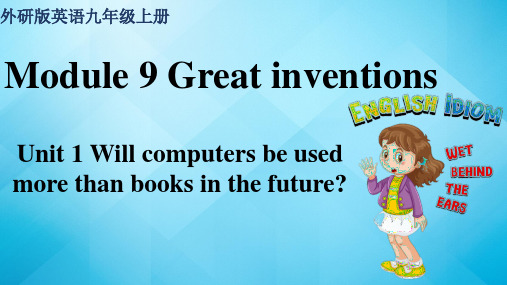
an you name some modern inventions?
Work in pairs and answer the questions. 1. How have the above inventions changed people’s lives? 2. Which one do you think is the most important? 3. What other important inventions can you think of?
Answer the questions.
electronic fix instruction invention
lend
mail page
website
1. How do you fix a camera if the memory card is full? 2. When do you need to read the instructions? 3. How often do you send messages by mail? 4. How many pages does this book have? 5. Which website do you often go to when you get online? 6. What is an example of electronic technology? 7. When you lend something to someone, what do they have to
__n_e_ed__f_il_m__ and photos can _b_e_s_e_n_t_b_y__e_m_a_i_l _. 4. Lingling thinks eveything __w_a_s_c_h_a_n_g_e_d__ by computers to some
外研版:九年级英语(上册)Module 9 《Great inventions》
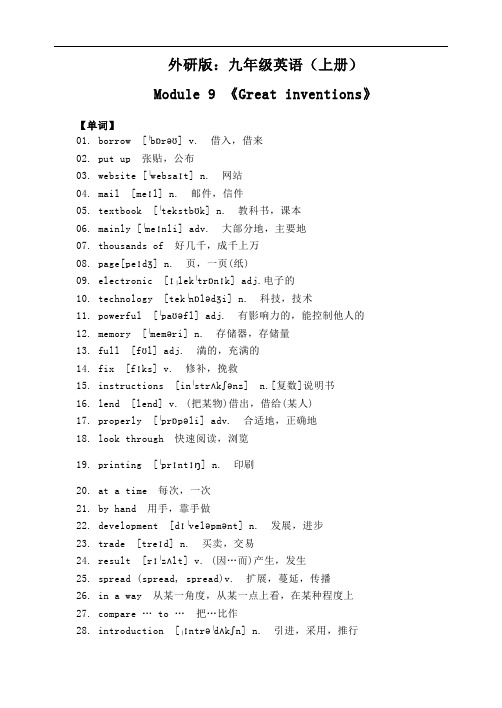
外研版:九年级英语(上册)Module 9 《Great inventions》【单词】01. borrow [ˈbɒrəʊ] v. 借入,借来02. put up 张贴,公布03. website [ˈwebsaɪt] n. 网站04. mail [meɪl] n. 邮件,信件05. textbook [ˈtekstbʊk] n. 教科书,课本06. mainly [ˈmeɪnli] adv. 大部分地,主要地07. thousands of 好几千,成千上万08. page[peɪdʒ] n. 页,一页(纸)09. electronic [ɪˌlekˈtrɒnɪk] adj.电子的10. technology [tekˈnɒlədʒi] n. 科技,技术11. powerful [ˈpaʊəfl] adj. 有影响力的,能控制他人的12. memory [ˈmeməri] n. 存储器,存储量13. full [fʊl] adj. 満的,充满的14. fix [fɪks] v. 修补,挽救15. instructions[inˈstrʌkʃənz] n.[复数]说明书16. lend [lend] v. (把某物)借出,借给(某人)17. properly [ˈprɒpəli] adv. 合适地,正确地18. look through 快速阅读,浏览19. printing [ˈprɪntɪŋ] n. 印刷20. at a time 每次,一次21. by hand 用手,靠手做22. development [dɪˈveləpmənt] n. 发展,进步23. trade [treɪd] n. 买卖,交易24. result [rɪˈzʌlt] v. (因…而)产生,发生25. spread (spread, spread)v. 扩展,蔓延,传播26. in a way 从某一角度,从某一点上看,在某种程度上27. compare … to …把…比作28. introduction [ˌɪntrəˈdʌkʃn] n. 引进,采用,推行29. amount [əˈmaʊnt] n. 量,数量30. store [stɔ:] v. 存储,储藏31. varied [ˈveərid] adj. 各种各样的,各不相同的32. form [fɔ:m] n. 种类,类型,形态,存在形式33. connection [kəˈnekʃn] n. 电话连接,计算机网络连接34. single [ˈsɪŋgl]adj. 仅一个的,单个的35. direction [dɪˈrɛkʃən] n. 方向36. replace[rɪˈpleɪs] v. 替换,取代37. wait and see 等等看,等着瞧【短语归纳】1. to some degree在某种程度上2. put up挂;张贴;公布;举起;搭起;3. on theschool website在学校网站上4.take goodcare of好好照顾;好好看管5. wait forweeks 等好几个星期6. hear from sb. 收到某人的信7. send andreceive photos and emails 发送和接收相片和邮件8. I wonder= I want to know 我想知道9. in the future 在将来in the past 在过去10.thousands of 数以千计的;成千上万的11. electronictechnology 电子技术12. morepowerful 更有效13.anyway 不管怎样14. Here itis . 它在这。
新版外研版九年级英语上册Module 9 Great inventions考点复习

九年级英语上册Module 9 Great inventions考点复习短语考点讲解:1. invention的词形变化:invent (v.t)创造,发明------> invention (n.) 发明------> inventor (n.) 发明家2. change (v.) 改变,变成常用短语:change …… into……:把……变成……3. think of / think about / think over的辨别:think of……:想出,认为/ think about……:考虑,思考/ think over……:仔细考虑4. borrow 和lend的短语辨别:①borrow:借来,借入------>常用短语:borrow……from……(从……借来……)②lend:借给,借出------->常用短语:lend……to……(把……借给……)5. visit的短语用法:①作动词:参观,拜访------> visit sb / visit someplace②作名词:参观,拜访------> be on a visit to…… / pay a visit to…… / make a visit to…… (sb / sp)6. wait常用短语辨别:①wait for……:等待某人或某物②can’t wait to do sth:迫不及待地要去做某事7. 数量单位词hundred / thousand / million / billion的用法:①数字+数量单位词<单数> +名词复数:表示准确数量的……②数量单位词<+s> + of……:表示粗略数量的……8. since:自从……时起①since可以标志“现在完成时”;since引导的时间状语从句必须用“一般过去时”。
②句型:It’s +(时间段)+ since引导“一般过去时”时间状语从句。
外研版九年级上册英语《Module 9 Great inventions Unit 3》集体备课教学
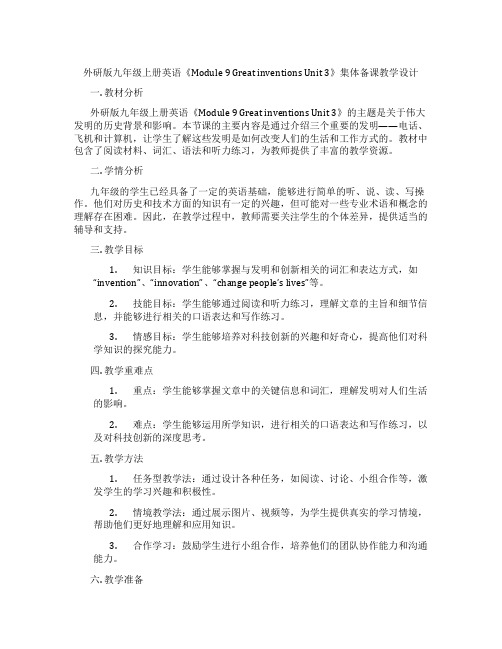
外研版九年级上册英语《Module 9 Great inventions Unit 3》集体备课教学设计一. 教材分析外研版九年级上册英语《Module 9 Great inventions Unit 3》的主题是关于伟大发明的历史背景和影响。
本节课的主要内容是通过介绍三个重要的发明——电话、飞机和计算机,让学生了解这些发明是如何改变人们的生活和工作方式的。
教材中包含了阅读材料、词汇、语法和听力练习,为教师提供了丰富的教学资源。
二. 学情分析九年级的学生已经具备了一定的英语基础,能够进行简单的听、说、读、写操作。
他们对历史和技术方面的知识有一定的兴趣,但可能对一些专业术语和概念的理解存在困难。
因此,在教学过程中,教师需要关注学生的个体差异,提供适当的辅导和支持。
三. 教学目标1.知识目标:学生能够掌握与发明和创新相关的词汇和表达方式,如“invention”、“innovation”、“change people’s lives”等。
2.技能目标:学生能够通过阅读和听力练习,理解文章的主旨和细节信息,并能够进行相关的口语表达和写作练习。
3.情感目标:学生能够培养对科技创新的兴趣和好奇心,提高他们对科学知识的探究能力。
四. 教学重难点1.重点:学生能够掌握文章中的关键信息和词汇,理解发明对人们生活的影响。
2.难点:学生能够运用所学知识,进行相关的口语表达和写作练习,以及对科技创新的深度思考。
五. 教学方法1.任务型教学法:通过设计各种任务,如阅读、讨论、小组合作等,激发学生的学习兴趣和积极性。
2.情境教学法:通过展示图片、视频等,为学生提供真实的学习情境,帮助他们更好地理解和应用知识。
3.合作学习:鼓励学生进行小组合作,培养他们的团队协作能力和沟通能力。
六. 教学准备1.教材和教学资源:准备《Module 9 Great inventions Unit 3》的教材和相关教学资源,如PPT、阅读材料、听力材料等。
Module+9+Great+inventions+Unit+1+课件外研版九年级英语上册
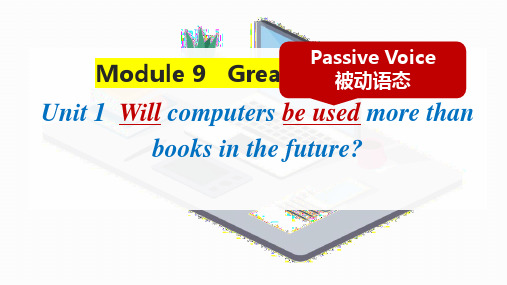
What Why
While-listening Task 2 Listen and choose the best answer. Answer orally (口头上地). (Act 3)
Tip: ①圈出选项的中心词;②比较选项,圈出选项的不同点;③细听关键信息
1. What does Tony want to borrow? (A computer. / A camera. / Paper books.)
online shopping 网购
What other important inventions can you think of?
While-listening Task 1 Listen and complete. (Act 2)
Daming, Betty and Lingling are talking about some important inventions.
2. Where will Tony’s photos be put up? (On the school newspaper. / On his WeChat Moments. / On the school website.)
3. How did Tony’s father get the camera? (It’s from his pen friend. / It’s a gift from Tony’s mother. / It’s bought on the Internet.)
Tip: Circle the key words and predict (预测) the answers.
1. Lingling loves her mobile phone because she can use it anywhere.
外研版英语九年级上册Module 9 Great Inventions课件
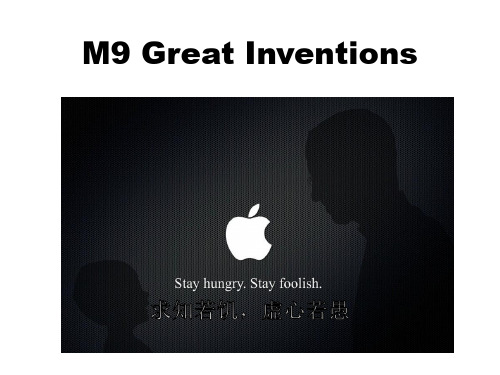
----Thomas Alva Edison
3 汽车之父
1886年,卡尔本茨 制造出第一辆汽车; 奔驰公司创始人之一
Who invented it? It was invented by Americans.
+be+done
I. 单项选择
1. Thanks to the Internet, different kinds of
information _______in a short time.
(2013 安徽卷)
A. can be learned B. have been learned
C. can learn
----No, you needn't. It ____after school.
(
(浙江丽水)
A. may clean
B. must cleam
C. need be cleaned D. can be cleaned
4. It ____(to drive after drinking wine).
Task 1 Page 74
2 Read the passage and match the main ideas with the paragraphs.
a) The world before printed books
2
b) The world after the invention of printing 3
D. has learned
2. ----Does she like singing English songs?
- 1、下载文档前请自行甄别文档内容的完整性,平台不提供额外的编辑、内容补充、找答案等附加服务。
- 2、"仅部分预览"的文档,不可在线预览部分如存在完整性等问题,可反馈申请退款(可完整预览的文档不适用该条件!)。
- 3、如文档侵犯您的权益,请联系客服反馈,我们会尽快为您处理(人工客服工作时间:9:00-18:30)。
introduction trade
Books were expensive after paper was invented because they were made by hand, but (1) developments __________ in printing made it cheaper and faster to make books. A(n) (2) _________ in trade books resulted, and knowledge (3) _________ more quickly spread than ever before. The (4) introduction __________ of the Internet has changed the world in a similar way, and the Internet is much more (5) _________. powerful With more and more people using the Internet, the (6) _________ direction that traditional printing will take replace in the future is uncertain, and computers may (7) _________ books one day.
Will books be replaced by the Internet?
Discuss and make a list of the advantages of books and the Internet.
Advantages of books
Advantages of the Internet 1.You can get information quickly. 2.You can get a great amount of information at a time. 3.The machine is smaller and lighter.
Will books be replaced by the Internet?
Activity 2 Read the passage and match the main ideas with the paragraphs. a) The world before printed books b) The world after the invention of printing c) Life with paper and printing d) Technology and books e) The future of books
He haven't spent any time study,as the result he fail the exam.
Printing
Later,developments in printing made it possible to produce books more quikly and cheaply.
Module 9 Great inventions
Unit2Will books be replaced by the Internet
Where did people start to write on in Shang Dynasty?
Oracle bone
Bamboo slip
About 3,600 years ago ,people created bamboo slip to write on.
Cai lun created paper in Han Dynasty.
In those says,books were only produced one at a time by hand.
As the result,there were not many books,and they were expensive.
para. 1 para. 2 para. 3 para. 4 para. 5
Activity3 Look through the passage again and complete the table. When About 2,000 years ago During the Sui and Tang Dynasties What paper created printing invented
1.Books are inexpensive. 2.Books can go with you anywhere and be read everywhere. 3.Books can help you keep your brains sideas spread faster than ever before.
The introduction of Internet changed our life.
A much large amout of information can be stored in more varied forms on the Internet than in books.
Today
the Internet growing fast, computers and the Internet used in classrooms, newspapers and magazines read online
developments direction powerful replace spread
